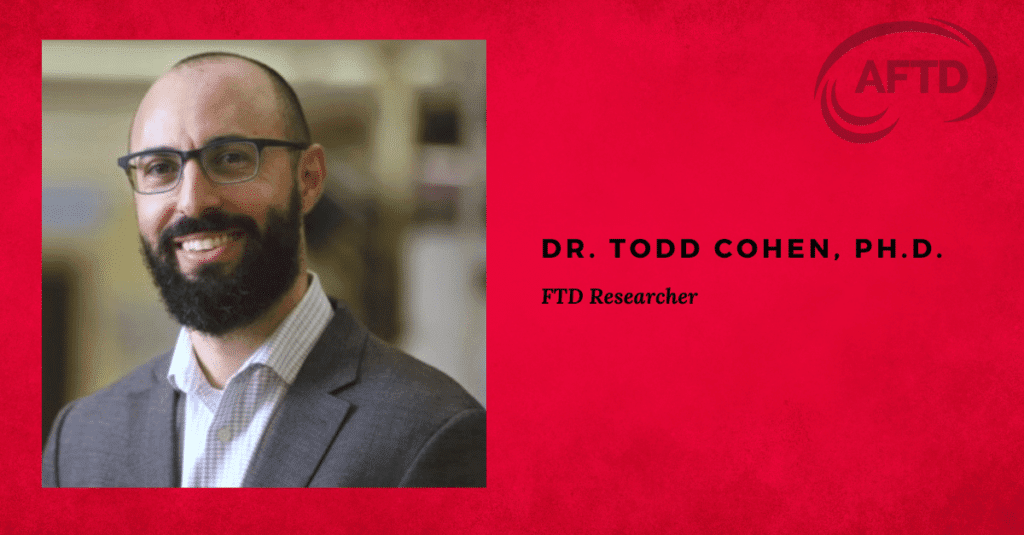Spotlight On…Dr. Todd J. Cohen, FTD Researcher

Todd J. Cohen, PhD, began his foray into FTD research when he was awarded AFTD’s first Postdoctoral Fellowship in 2009.
Since receiving the inaugural AFTD fellowship, Dr. Cohen now heads The Cohen Lab at the University of North Carolina (UNC) Chapel Hill, studying the clinical aspects of FTD, Alzheimer’s, amyotrophic lateral sclerosis (ALS), and other neurodegenerative diseases.
He was introduced to AFTD during his postdoctoral tenure at the Center for Neurodegenerative Disease Research at the University of Pennsylvania. Dr. Cohen, now an assistant professor of neuroscience research at UNC Chapel Hill, said that receiving the AFTD postdoctoral fellowship was the catalyst that pushed him forward on his FTD path.
“[The fellowship] put me on a trajectory to do this type of work. My lab encompasses a lot of things that the FTD world cares about and a lot of that got started in 2009 with the fellowship,” Dr. Cohen told AFTD. “All of these years later, I work on the two proteins that are legitimately thought to be the cause of FTD.”
Along with his cohort of students at UNC Chapel Hill, Dr. Cohen studies tau and TDP-43 proteins, the abnormal accumulations of which have been linked to FTD. Since 2010, his research has assessed how different enzymes modify tau and why proteins aggregate. In The Cohen Lab, he uses an array of models and systems to study neurons affected by these protein aggregates.
“We’ve been able to go on trajectories to ask how does tau and how does TDP-43 actually kill neurons. We’re using every system you could want to use such as mice, neurons that you can grow from stem cell models, neurons that we grow in a dish, and recombinant purified proteins. We do whatever we need to do to see if we can keep a neuron alive by treating it with something that will make it better. We hope that will relate to a person with FTD because we want to make their neurons better,” Dr. Cohen said.
Dr. Cohen’s initial fellowship with AFTD has since spawned additional research grants from the National Institutes of Health (NIH), the Muscular Dystrophy Association (MDA), and CurePSP. He was also awarded an AFTD Pilot Grant in 2017 to develop new animal models of FTD caused by mutant tau proteins.
Dr. Cohen emphasized the significance of being an AFTD fellowship and grant recipient, saying “that’s exactly the type of mission for this kind of program, to spark new avenues for discovery with the hope that we can create new models and develop new therapies for the disease. That’s what we’re doing.”
AFTD’s Impact and the Future of FTD Research
With the emergence of FTD clinical trials and the development of gene therapies, Dr. Cohen estimates research efforts will lead to more effective ways of treating persons diagnosed with FTD within the next decade.
“There are going to be better ways to treat [persons diagnosed] with new technology and better ways to monitor biomarkers of early disease onset,” said Dr. Cohen. “Developing those assays is really going to advance in the next few years.”
He hopes that the students who work in his lab will go on to lead research labs of their own that continue the progression of FTD research. Dr. Cohen noted that “if it wasn’t for the initial AFTD fellowship, I think I’d be doing other work. They kept me in this trajectory because they supported my work. I hope that in 2031 I’ll still be doing FTD work.”
Dr. Cohen recalled watching AFTD’s scientific research community grow over the last 10 years, citing the magnitude of the organization’s support of neuroscience researchers.
“AFTD is a blossoming organization that’s doing really well and the numbers of fellowships that are offered has skyrocketed. AFTD is working with other foundations to jointly offer fellowships — those are the things that you want. From every perspective, it has turned into a full-fledged organization that supports clinical and basic work while also supporting people that are going to breed the next generation of FTD research. That’s the measure of success.”
By Category
Our Newsletters
Stay Informed
Sign up now and stay on top of the latest with our newsletter, event alerts, and more…
